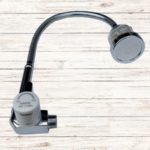Most washing machines today have a display panel and a timer feature. However, sometimes the machine may indicate that there is only 1 hour left, but in reality, the washing cycle may end later.
Why is the timer on washing machines often incorrect?
The time for each wash is set differently depending on the wash mode and the type of machine. For example, if your home machine has a normal wash mode that takes 1 hour, the actual washing time may be longer. Factors such as the weight, quantity, and material of the clothes may be related to this phenomenon.
Another factor that can cause the displayed time to not match the actual time is that the washing machine’s timer sometimes conflicts with internal measurement systems, such as load sensors – the main component for measuring the amount of laundry and the standard amount of water for washing. When the measured amount of laundry is incorrect, the time is also calculated incorrectly, and the timer will display a different number from the actual time.
The timer on the washing machine usually displays the optimal mode and conditions, so the actual washing time may be longer, with a margin of error of up to several minutes.

Why is the timer on washing machines often incorrect? It’s because it usually displays in the optimal mode, making the actual washing time longer. (Photo: Istock)
If the timer on the washing machine regularly deviates too much without being due to the amount of laundry, the causes may be:
Selecting the wrong wash mode
One of the top reasons for a longer wash cycle is selecting the wrong mode. Washing machines have different wash modes with separate washing times; if you choose the wrong mode, the time for each wash will be extended. Many washing machines have a soaking mode that can last up to 150 minutes.
You should read and understand the wash modes carefully before starting the machine to avoid wasting time.
Inadequate water pressure
Weak water sources are an important cause of slow washing. Normally, the water supply time for some washing machines is about 5 to 10 minutes per batch. If your home water source is too weak, the water supply time will be prolonged, resulting in a longer total washing time. Over time, if the washing machine is not cleaned, the filter may become clogged, causing the water supply to be slow.
If the washing machine is slow due to weak water pressure, you should change the location to somewhere with higher water pressure or install a separate booster pump for it. Additionally, if your washing machine is a top-loader, you can directly add water to the drum.
Weak electricity
If the voltage in your home is lower than the rated voltage of the washing machine, the washing time will be extended. Weak electricity may cause the washing machine to display errors, and it could even prevent the machine from operating.
For this case, you should rectify the situation by using a voltage stabilizer device. It will also help prolong the lifespan of electrical devices in your home.
Spin cycle affecting the washing time
Many people wonder why the timer on the washing machine is often incorrect but don’t realize that choosing the spin mode can also prolong the machine’s operating time. In the final stage of the cycle, the drum will spin at the highest speed to remove water from the clothes. However, different fabrics have different water-retention capabilities. If the sensor detects that the clothes are still damp, it will activate the spinning cycle again. The more types of fabric there are, the longer the spinning time will be.
According to VTC news
4 Tips for Increasing the Water Pressure in Your Showerhead
Are you frustrated by weak water pressure coming from your shower? If so, you’re not alone – many homeowners struggle to get adequate water pressure when they’re washing up. Fortunately, there are simple solutions available to help increase the water pressure of your shower – here are 4 easy steps that could help improve shower performance!





































